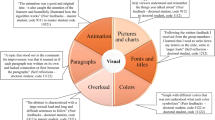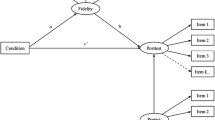Abstract
This study examined gains undergraduate students made in their communication and collaboration skills when they served as peer teachers, i.e., laboratory instructors (LIs), for a General Psychology laboratory. Self-ratings of communication and collaboration skills were completed before and after teaching the laboratory. When compared to before the teaching experience, the students rated their skills significantly higher in written expression, oral expression, and participation skills. They also rated themselves significantly higher in written comprehension and expression skills than did a comparison group of non-LIs. Results from interviews also revealed beliefs that their communication and collaboration skills had substantially increased.
Similar content being viewed by others
References
American Psychological Association (2007). APA guidelines for the undergraduate psychology major. Washington, DC: Author. Retrieved from www.apa.org/ed/resources.html
American Psychological Association (2010). Ethical Principles of Psychologists and Code of Conduct. Washington, DC: Author. Retrieved from http://www.apa.org/ethics/code/index.aspx#
American Psychological Association Board of Educational Affairs (2013). Working group on strengthening the common core of the introductory psychology course. Strengthening the common core of the introductory psychology course. Retrieved from http://apa.org/ed/governance/bea/intro-psych-report.pdf
Bandura, A. (1993). Perceived self-efficacy in cognitive development and functioning. Educational Psychologist, 28, 117–148.
Casner-Lotto, J., & Barrington, L. (2006). Are they really ready to work? Employers’ perspectives on the basic knowledge and applied skills of new entrants to the 21st century U.S. workforce. Retrieved from http://www.conference-board.org/pdf_free/BED-06-Workforce.pdf
Clary, E. G., Olson, A. M., Sherman, B., & Thorsheim, H. (2003). The General Psychology Laboratory: Learning how to do psychological science. St. Petersburg Beach, FL: Panel presentation at the Twenty-fifth Annual Conference for the National Institute on the Teaching of Psychology.
Coker, J. S., & Van Dyke, C. G. (2005). Evaluation of teaching and research experiences undertaken by botany majors at N.C. State University. North American Colleges and Teachers of Agriculture Journal, 49, 14–19.
Dunning, D., Johnson, K., Erhlinger, J., & Kruger, J. (2003). Why people fail to recognize their own incompetence. Current Directions in Psychological Science, 12(3), 83–87.
Fingerson, L., & Culley, A. B. (2001). Collaborators in teaching and learning: Undergraduate teaching assistants in the classroom. Teaching Sociology, 29, 299–315. doi:10.2307/2F1319189
Glaser, B. G., & Strauss, A. L. (1967). Discovery of grounded theory: Strategies for qualitative research. Chicago, IL: Aldine Publications.
Good, J., Halpin, G., & Halpin, G. (2000). A promising prospect for minority retention: Students becoming peer mentors. Journal of Negro Education, 69, 375–383. doi:10.2307/2F2696252
Hogan, T. P., Norcross, J. C., Cannon, J. T., & Karpiak, C. P. (2007). Working with and training undergraduates as teaching assistants. Teaching of Psychology, 34, 187–190. doi:10.1080/2F00986280701498608
Jackling, B., & Macdowall, T. (2008). Peer mentoring in an accounting setting: A case study of mentor skill development. Accounting Education: An International Journal, 17, 447–462. doi:10.1080/09639280802436756
Kinzie, J., Thomas, A. D., Palmer, M. M., Umbach, P. D., & Kuh, G. D. (2007). Women students at coeducation and women’s colleges: How do their experiences compare? Journal of College Student Development, 48, 145–165. doi:10.1353/csd.2007.0015
Kuh, G. D., & Andreas, R. E. (1991). It’s about time: Using qualitative methods in student life studies. Journal of College Student Development, 32, 397–405.
Landrum, R. E., & Harrold, R. (2003). What employers want from psychology graduates. Teaching of Psychology, 30, 131–133. doi:10.1207/S15328023TOP3002_11
Li, G., Long, S., & Simpson, M. E. (1999). Self-perceived gains in critical thinking and communication skills: are there disciplinary differences? Research in Higher Education, 40, 43–60.
McCroskey, J. C., & McCroskey, L. L. (1988). Self-report as an approach to measuring communication competence. Communication Research Reports, 5, 108–113.
McKeegan, P. (1998). Using undergraduate teaching assistants in a research methodology course. Teaching of Psychology, 25, 11–14. doi:10.1207/2Fs15328023top2501_4
Micari, M., Streitwieser, B., & Light, G. (2006). Undergraduates leading undergraduates: Peer facilitation in a science workshop program. Innovative Higher Education, 30, 269–288. doi:10.1007/s10755-005-8348-y
National Center for O*NET Development (2010). The O*NET Content Model. Retrieved from O*Net Online website: http://www.onetcenter.org/content.html
Newcomb, A. F., & Bagwell, C. L. (1997). Collaborative learning in an introduction to psychological science laboratory: Undergraduate teaching fellows teach to learn. Teaching of Psychology, 24, 88–95. doi:10.1207/2Fs15328023top2402_2
Olson, A. M. (2000). A theory and taxonomy of individual team member performance (Unpublished doctoral dissertation). Minneapolis, MN: University of Minnesota.
Patton, M. Q. (2002). Qualitative research and evaluation methods (3rd ed.). Thousand Oaks, CA: Sage.
Rider, E. A., Hinrichs, M. M., & Lown, B. A. (2006). A model for communication skills assessment across the undergraduate curriculum. Medical Teacher, 28, 127–134. Retrieved from http://informahealthcare.com/doi/pdf/10.1080/01421590600726540
Roderick, C. (2009). Undergraduate teaching assistantships: Good practices. Mountainrise, The International Journal of the Scholarship of Teaching and Learning. Retrieved from www.wcu.edu/facctr/mountainrise/archive/vol5no2/html/finuta.pdf
Roscoe, R. D., & Chi, M. T. H. (2007). Understanding tutor learning: Knowledge-building and knowledge-telling in peer tutors' explanations and questions. Review of Educational Research, 77, 534–574. doi:10.3102/0034654307309920
Schalk, K., McGinnis, J., Harring, J., Hendrickson, A., & Smith, A. (2009). The undergraduate teaching assistant experience offers opportunities similar to the undergraduate research experience. Journal of Microbiology & Biology Education, 10, 32–42. doi:10.1128/jmbe.v10i1.97
Smith, T. (2008). Integrating undergraduate peer mentors into liberal arts courses: A pilot study. Innovative Higher Education, 33, 49–63. doi:10.1007/2Fs10755-007-9064-6
Thieman, T. J., Clary, E. G., Olson, A. M., Dauner, R. C., & Ring, E. E. (2009). Introducing students to psychological research: General Psychology as a laboratory course. Teaching of Psychology, 36, 160–168. doi:10.1080/00986280902959994
Author information
Authors and Affiliations
Corresponding author
Rights and permissions
About this article
Cite this article
Peterson, J.J., DeAngelo, S., Mack, N. et al. Communication, Communication, Communication! Growth through Laboratory Instructing. Innov High Educ 39, 321–332 (2014). https://doi.org/10.1007/s10755-013-9279-7
Published:
Issue Date:
DOI: https://doi.org/10.1007/s10755-013-9279-7




